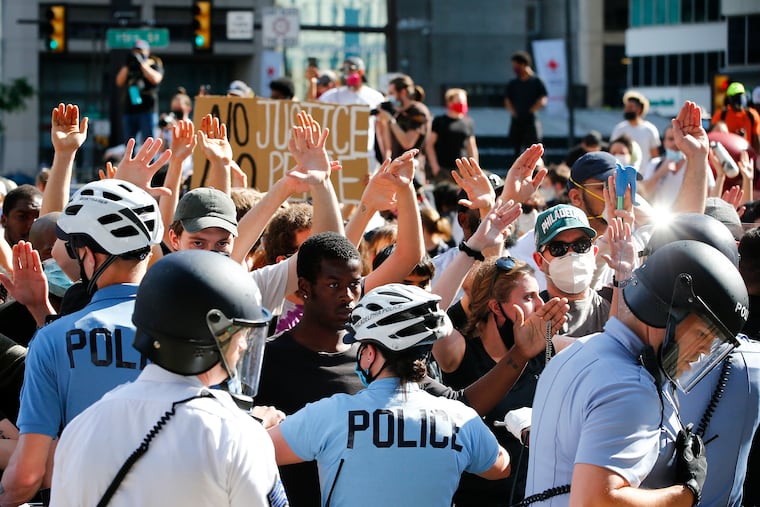Reforming police requires action, not commissions | Opinion
In the wake of marches and protests following the death of George Floyd at the hands of Minneapolis police, the last thing we need is a replay of commission reports that have been issued over the years and rarely have led to meaningful reform.

It was entirely predictable that the massive protests over the killing of George Floyd would lead to calls for commissions, congressional hearings, and studies into the causes and remedies for systemic abuses of power by law enforcement officers.
But the last thing we need at this point is a replay of commission reports that have rarely led to meaningful reform. We have long documented the core reasons for systemic misconduct — the failure to adopt proven best practices, little or no transparency with respect to the impact of policing measures, and most important, a stunning lack of accountability.
These factors have resulted in a system marked by excessive use of force, militarization of police operations, racial bias in stops, searches, and arrests, corrupt investigative practices that lead to wrongful convictions, and suppression of speech of those without power. Yet, because those who suffer the most from these practices are from communities of color, or otherwise without political power, we have failed to make the necessary political and cultural changes.
We cannot expect police to act consistently with constitutional guarantees of equality, fairness, and integrity without a system that is built on full transparency, oversight, and accountability. The failure of government and the courts to mandate and implement policies that would ensure democratic controls on the police leaves them with broad immunity from even the most harmful abuses and does little to incentivize good policing.
So, what should be done?
Adopt best practices, disinvest in police, invest in social services
On the core issues of policing that have generated the most concern and contention, there are “best practices” that can provide far greater protection from abuse. For example, on use of force, there are model policies that would change policing from a “warrior” to a “guardian” model, with an emphasis on de-escalation techniques, respect for human life, and sensible restrictions on the use of deadly force.
With respect to racial disparities, police data show that African Americans are subjected to illegal use of force, unconstitutional police stops and arrests, and arrests for drug violations in far larger numbers than white civilians, even after controlling for possible nonracial reasons for these telling disparities. Where racial disparities are so pronounced, the policing measures must be strongly modified or eliminated, and if departments do not act, these specific operations should be defunded.
Moreover, we should transfer funds from police departments to social service agencies and community groups to more effectively settle minor disputes and address issues that do not need, but now invite, police intervention.
As the DNA revolution has shown, police investigative methods, including coercive and misleading interrogation of suspects, suggestive identification procedures, junk forensic science, and suppression of exculpatory evidence, have led to thousands of convictions of innocent suspects. Yet, some police departments continue to resist reforms that can eliminate these dangerous practices.
If we do not have fair policies and effective training, there will be no progress. However, without two additional system-wide changes, the best policies and training will be rendered largely irrelevant.
Increase transparency
There must be full transparency with respect to current police practices, including wider use and access to videos from body-worn cameras, accurate data as to police use of force, and far greater data compilation and analysis of all policing measures on which there are racial disparities. In a world increasingly dominated and measured by data and algorithms, there is simply no excuse for ignoring or hiding the data which can expose the impacts — positive and negative — of current policing.
And there can no longer be confidentiality of civilian complaints against police, internal investigations, and disciplinary proceedings. The public has a right to know if this system is working, and why police avoid discipline for clear cases of misconduct.
Boost accountability
There must be full accountability. Police have almost unlimited powers over the lives of others, up to the use of deadly force, and yet they are in many places almost entirely free from effective methods of accountability. One of the great ironies of our system is that the police, who insist on maximum accountability for those accused of crime, including the harshest penalties and the fewest possible rights, are themselves almost fully immune from prosecution for criminal conduct and are protected by a web of immunities from civil suit damages.
Even more perniciously, due to the “super due process rights” granted to them by government officials (and which are not provided to other workers), they are largely free from internal discipline even for egregious violations of the rights of civilians. The lack of accountability is the result of the enormous political powers of police unions (abetted by elected officials too timid to change the status quo) and of broad judicial restrictions on access to the courts for those who are subjected to misconduct. In short, without effective deterrents, police assume, quite correctly, that the risk of sanctions is not a reality in their world.
We know from experience how to change these dynamics, but it will take far more than congressional hearings, new commissions, or exhortations to equal justice; to guarantee, in practice, rather than in our constitutional and political rhetoric, a democracy built on respect for full and equal human rights. The challenge has been made by millions of protesters. Will we listen, and more important, will we respond by action?
David Rudovsky is a civil rights and criminal defense attorney with the law firm Kairys, Rudovsky, Messing, Feinberg, & Lin. He is also a senior fellow at Penn Law School.